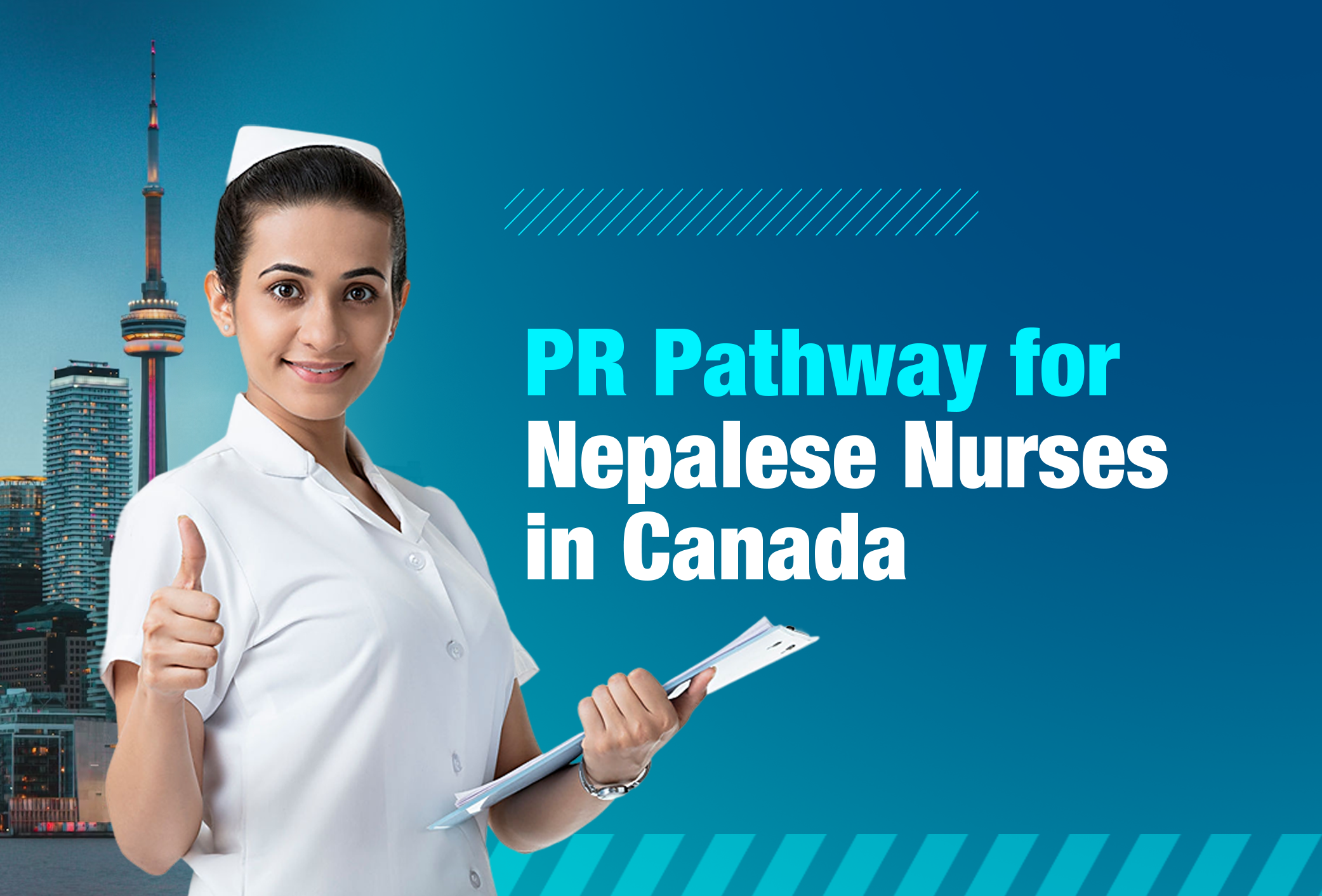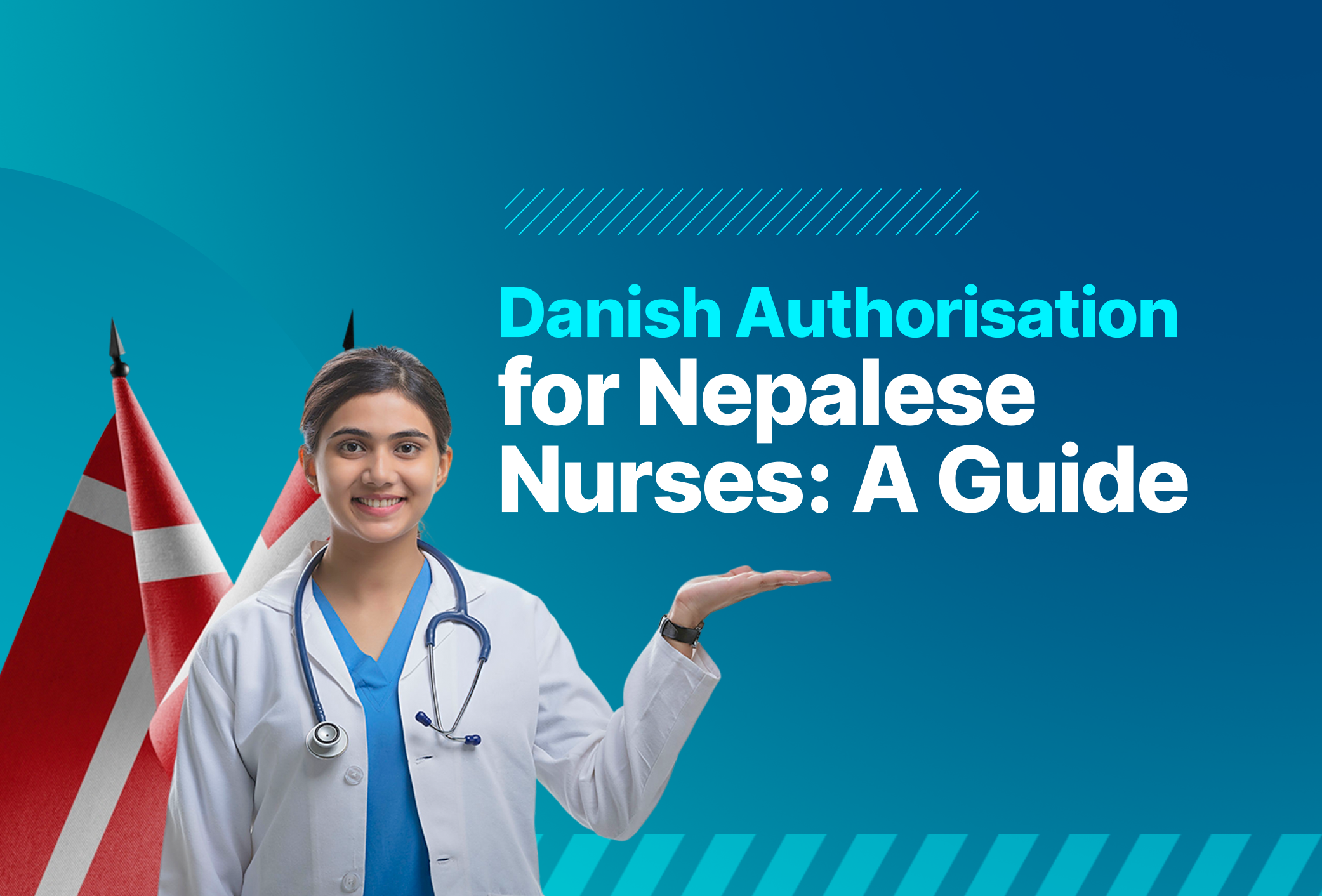16 Jul 2025
NclexHub

Are you a Nepalese nurse dreaming of a better future in Canada? You're not alone. Every year, thousands of internationally educated nurses (IENs), including from Nepal, move to Canada for career growth, better pay, and permanent residency (PR). Whether you hold a B.Sc. Nursing, BN, or even a PCL Nursing qualification, Canada offers an accessible and rewarding PR pathway and yes, you can apply with your dependents too!
In this complete guide, we’ll walk you through everything from eligibility to Express Entry, required exams, provincial programs (PNPs), documents and the Permanent Residence Pathway - Canada’s immigration stream for frontline heroes like you.
Table of Contents
- Why Choose Canada as a Nurse?
- Nursing Work Categories for Nepali Nurses in Canada
- PR Pathway for Nepali Nurses in Canada
- Express Entry for Nepali Nurses in Canada
- Provincial Nominee Program (PNP) for Nepali Nurses in Canada
- Quebec Immigration Scheme for Nepali Nurses in Canada
- Cost to Apply for Nursing PR in Canada from Nepal
- Conclusion
- FAQs - PR Pathway for Nepalese Nurses in Canada
Why Choose Canada as a Nurse?
Canada is one of the most welcoming countries in the world for internationally educated nurses (IENs)—including those from Nepal. Here's why thousands of nurses choose Canada every year to build a stable, respected, and well-paid career:
1. High Demand for Nurses
Across the Country Canada is facing a critical nursing shortage due to an aging population and healthcare workforce retirements. As a result, every province and territory is actively hiring foreign-trained nurses.
2. Pathway to Permanent Residency (PR)
Nursing is a priority occupation in almost all PR streams, including:
- Express Entry (Federal Skilled Worker Program)
- Provincial Nominee Programs (PNPs)
- Quebec Immigration
You can apply for PR even while working or studying, and include your spouse and children in your application.
3. Earn Globally Competitive Salaries
Nurses in Canada earn between CAD $60,000–$100,000+ per year, depending on province and role.
Example:
- RN in Ontario: ~$75,000/year
- LPN in Alberta: ~$60,000/year
4. Work-Life Balance & Employee Benefits
Canada offers:
- Regulated working hours (usually 37 - 40 hours/week)
- Overtime pay
- Paid vacations and sick leave
- Comprehensive health insurance and pension plans
5. Free Healthcare & Education for PR Holders
Once you gain permanent residency:
- You and your family get free access to public healthcare
- Your children can attend public schools for free
6. Safe, Multicultural Environment
Canada is:
- One of the safest countries globally
- Home to multicultural cities like Toronto, Vancouver, and Calgary
- Welcoming to immigrants from Nepal and South Asia
7. Opportunities for Career Growth
After working as an RN or LPN, you can pursue:
- Nurse Practitioner (NP) roles (with higher pay)
- Specializations like ICU, ER, pediatrics, public health
- Advanced education like Master’s or PhD in Nursing
8. Bridging & Pathway Courses for IENs
Canada offers bridging programs for internationally educated nurses to meet licensing requirements, easing your transition into the system.
Nursing Work Categories for Nepali Nurses in Canada
To work legally in Canada, internationally educated nurses must qualify under one of the following categories:
Registered Nurse (RN)
- Requires a bachelor's degree in nursing
- Broader scope of practice and higher salary
- Must pass the NCLEX-RN exam
Licensed Practical Nurse (LPN) / Registered Practical Nurse (RPN)
- Requires a diploma in practical nursing
- More limited scope than RNs
- Must pass the Canadian Practical Nurse Registration Examination (CPNRE) exam
Nurse Practitioner (NP)
- Advanced practice role requiring a master’s degree
- Can diagnose, prescribe, and manage treatment plans
Most Nepalese nurses start as RN or LPN, depending on their education and licensing assessment.
PR Pathway for Nepali Nurses in Canada
Nurses are in high demand across Canada; for this reason, there are a number of Canadian immigration pathways for nurses to choose from. You might be eligible to enter Canada as a skilled worker as a nurse under one of the numerous federal and provincial economic immigration schemes. The major PR pathway for international nurses in canada are:
- Express Entry
- Provincial Nominee Programs (PNP)
- Quebec Immigration
Express Entry for Nepali Nurses in Canada
Express Entry is the fastest and most popular pathway for skilled professionals, including Nepali nurses to immigrate and settle in Canada with Permanent Residency (PR). If you’re a Registered Nurse (RN), Licensed Practical Nurse (LPN), or have a BSc/BN/PCL Nursing degree from Nepal, this system could be your gateway to a brighter future in Canada.
What is Express Entry Program in Canada?
Express Entry is an online immigration application system used by the Government of Canada to manage PR applications for skilled workers under three main programs:
- Federal Skilled Worker Program (FSWP) – most relevant for nurses from Nepal
- Canadian Experience Class (CEC)
- Federal Skilled Trades Program (FSTP)
Nurses typically apply under the Federal Skilled Worker Program (FSWP) if applying directly from Nepal.
Basic Eligibility Requirements of Express Entry for Nepali Nurses (FSWP)
To be eligible as a Nepali nurse under Express Entry, you must meet the following:
|
Criteria |
Minimum Requirement |
|---|---|
|
Education |
Nursing qualification (BSc/BN/PCL) evaluated by WES or equivalent (ECA report) |
|
Work Experience |
Minimum 1 year of continuous, full-time (or equivalent part-time) paid nursing work within the last 10 years |
|
Language Proficiency |
Minimum CLB 7 (IELTS General: 6.0 in Listening, Reading, Writing, Speaking) |
|
Age |
No official age limit, but best CRS points awarded under age 35 |
|
Proof of Funds |
Required unless you have a valid job offer in Canada |
|
Other |
Must meet health, character (police clearance), and admissibility standards |
Step-by-Step Guide to Apply for Express Entry in Canada
Step 1: Get an Educational Credential Assessment (ECA)
- Use WES, IQAS, or another IRCC-approved body to verify your degree. This confirms your education is equal to a Canadian credential.
Processing Time: 3 - 8 weeks
Cost: CAD $220–$300 (Approx.)
Step 2: Take the IELTS General Training Test
- Minimum score: CLB 7 (IELTS 6.0 in each band)
- Higher scores boost your CRS (Comprehensive Ranking System) score
- Recommended: Aim for CLB 8 or 9 for competitive advantage
Step 3: Create Your Express Entry Profile
- Visit Express Entry: Create your profile and enter the pool - Canada.ca and create an account
- Choose the Federal Skilled Worker Program (FSWP)
- Enter your details: education, language, experience, etc.
- Get your CRS Score - Target CRS: 470+ increases chances, but PNP can help if lower
Step 4: Wait for an Invitation to Apply (ITA)
- IRCC conducts regular draws. If your CRS score meets or exceeds the cutoff, you’ll get an Invitation to Apply (ITA)
- You may also apply for PNPs to gain 600 additional CRS points
Step 5: Submit PR Application Within 60 Days
You’ll need to submit:
- Passport
- IELTS result
- ECA report
- Work experience letters
- Proof of funds
- Police clearance
- Medical exam
Processing Time: Usually 6–12 months
Step 6: Receive Confirmation of PR (COPR)
Once approved:
- You’ll receive Confirmation of Permanent Residence
- You can move to Canada and begin your licensing process (via NNAS and provincial bodies)
Provincial Nominee Program (PNP) for Nepali Nurses in Canada
The Provincial Nominee Program (PNP) is one of the most effective pathways for Nepali nurses to gain Canadian Permanent Residency (PR), especially if your CRS score under Express Entry is low or if you're looking to settle in a specific province. Each Canadian province and territory (except Quebec and Nunavut) operates its own immigration program, allowing them to nominate candidates based on local labour shortages and nursing is a top-priority occupation almost everywhere.
Benefits of PNP for Nepali Nurses
- Easier eligibility compared to Express Entry
- Some PNPs don’t require a job offer
- Lower IELTS score accepted in certain provinces
- Additional 600 CRS points if linked to Express Entry
- Family can be included in the application
Who Should Choose PNP?
- Nurses with lower CRS scores (under 470)
- Nurses with specific provincial preferences (e.g., Ontario, BC, Nova Scotia)
- Nurses who want to increase their Express Entry score
- Those with job offers in Canada or already studying/working in Canada
Step-by-Step Guide to Apply for Provincial Nominee Program (PNP) in Canada
1. Choose a Province Based on Demand for Nurses
Top provinces with active PNP streams for nurses include:
- Ontario: Human Capital Priorities Stream
- British Columbia: Skilled Worker – Health Authority
- Nova Scotia: Labour Market Priorities Stream
- Alberta: Alberta Express Entry Stream
- Saskatchewan: International Skilled Worker
- New Brunswick: Skilled Worker Stream
2. Apply for a Nursing License in the Province (Optional but Strongly Recommended)
You’ll eventually need to register with the provincial nursing regulatory body. Some provinces may prioritize applicants who have started this process.
Example:
- Ontario → College of Nurses of Ontario (CNO)
- BC → British Columbia College of Nurses & Midwives (BCCNM)
- Alberta → College of Registered Nurses of Alberta (CRNA)
3. Apply for PNP Directly or Through Express Entry (2 Options)
Option A: PNP via Express Entry (Enhanced PNP)
- Create an Express Entry profile
- Get selected by a province
- Receive 600 additional CRS points
- Automatically receive an Invitation to Apply (ITA) for PR
Option B: Apply Directly to a Province (Base PNP)
- Submit application to the province outside of Express Entry
- Receive a Nomination Certificate
- Apply for PR via IRCC separately
4. Submit Your PR Application to IRCC
Once nominated, submit your complete PR application to the IRCC (Immigration, Refugees and Citizenship Canada) along with:
- IELTS Test Scores
- ECA Report
- Work experience letters
- Proof of funds
- Medical & police clearance
- Provincial Nomination Certificate
Quebec Immigration Scheme for Nepali Nurses in Canada
Quebec offers a unique immigration pathway for internationally educated nurses, including those from Nepal, through its Regular Skilled Worker Program (RSWP). This program is ideal for nurses willing to live and work in Quebec and who can demonstrate French language proficiency.
Key Requirements for Quebec Immigration (Nurses)
|
Requirement |
Details |
|---|---|
|
Immigration Program |
Regular Skilled Worker Program (RSWP) |
|
Language |
French proficiency required (TEF/TCF recommended) |
|
Education |
Nursing diploma/degree (BSc, BN, PCL) evaluated by Quebec |
|
Experience |
Minimum 1 year in the past 5 years (in or outside Canada) |
|
Age |
Preferably under 40 (for points) |
|
Points-Based Selection |
Based on age, education, experience, language, spouse’s profile, etc. |
|
Nursing License |
Apply directly to OIIQ (Ordre des infirmières et infirmiers du Québec) |
|
Job Offer |
Not mandatory but improves selection chances |
Important Notes:
- NNAS is not used in Quebec. Nurses must apply directly to OIIQ.
- Without French skills, it's very difficult to qualify for immigration or licensing.
Cost to Apply for Nursing PR in Canada from Nepal
Applying for Permanent Residency (PR) as a nurse from Nepal involves several steps and associated costs. Here’s a breakdown of the typical expenses involved in the process:
|
Expense Category |
Estimated Cost (CAD) |
Approx. NPR |
|---|---|---|
|
IELTS Preparation + Exam |
CAD 400 |
NPR 40,000 |
|
ECA (WES or others) |
CAD 255 |
NPR 25,500 |
|
NNAS (Nursing Assessment) |
CAD 845 |
NPR 84,500 |
|
NCLEX - RN Preparation + Exam Fee |
CAD 850 |
NPR 85,000 |
|
IRCC PR Application Fee |
CAD 1,545 (For single applicant) |
NPR 154,500 |
|
Medical Examination |
CAD 100 - 150 |
NPR 10,000 - 15,000 |
|
Police Clearance Certificate |
CAD 5 (For regular application) |
NPR 500 |
|
Biometrics Fee |
CAD 85 (For single applicant) |
NPR 850 |
|
Miscellaneous (Documentation, Courier, Translations, etc.) |
CAD 200 - 400 |
NPR 20,000 - 40,000 |
Notes: Costs vary depending on province and individual cases.
Conclusion
Canada is one of the most welcoming and rewarding destinations for Nepalese nurses looking to build a secure, respected, and well-paying career abroad. With multiple immigration options - Express Entry, Provincial Nominee Programs (PNPs), and even the Quebec Skilled Worker Program, nurses with qualifications like BSc, BN, or even PCL can apply and settle permanently in Canada.
Whether you're applying directly from Nepal or after studying in Canada, the process is achievable with the right IELTS score, ECA, and work experience. Plus, the opportunity to bring your spouse and children, enjoy free healthcare, and grow professionally in a safe and diverse environment makes Canada an ideal long-term choice.
From PR application to nursing registration and eventually working as a Registered Nurse (RN) or Licensed Practical Nurse (LPN), the journey may be challenging—but it’s worth it.
If you're a Nepalese nurse dreaming of a better future, Canada offers not just a job but a new life. Contact us now to take the further step ahead.
FAQs - PR Pathway for Nepalese Nurses in Canada
1. How to get permanent residency in Canada as a nurse?
You can get PR by applying through pathways like Express Entry or Provincial Nominee Programs (PNPs) Pathway. The process involves completing an ECA, passing IELTS (CLB 7), having at least 1 year of work experience, and meeting licensing requirements like NNAS and NCLEX-RN (for RNs).
2. Can I get PR after BSc nursing in Canada?
Yes. If you study BSc Nursing in Canada, you can apply for a Post-Graduation Work Permit (PGWP), gain Canadian work experience, and become eligible for Express Entry or PNPs, which lead to PR. Canadian credentials and work experience significantly boost your PR chances.
3. Which is the easiest PR pathway in Canada?
For nurses, the Provincial Nominee Program (PNP) is often the easiest, especially if your CRS score is low or you have a provincial job offer. Provinces like Nova Scotia, Ontario, and Manitoba regularly invite foreign-trained nurses even without job offers.
4. Is OET valid for Canada PR for nurses?
No, OET is not accepted for immigration (PR) purposes. OET is accepted for nursing registration by some regulators (like BCCNM or CNO), but IELTS General Training is mandatory for Express Entry, PNP, and PR applications.
5. What is the minimum IELTS score for nurses in Canada?
You need at least CLB 7, which equals IELTS 6.0 in each band (Listening, Reading, Writing, Speaking) in the General Training module for PR eligibility. Higher scores improve your CRS ranking.
6. Is OET easier than IELTS for nurses?
Yes, many nurses find OET easier because it is healthcare-specific, using real medical scenarios and vocabulary. However, it is not accepted for PR, but only for nursing license applications in some provinces.
7. What is the Express Entry pathway for nurses in Canada?
The Express Entry pathway is a fast-track immigration system for skilled workers, including nurses, to apply for Permanent Residency (PR) in Canada. As a nurse, you can apply through the Federal Skilled Worker Program (FSWP) if you have at least 1 year of work experience, meet the language requirements, and have your nursing education assessed (ECA). After creating your Express Entry profile, you receive a CRS (Comprehensive Ranking System) score. If your score is high enough—or if you’re nominated by a province—you’ll get an Invitation to Apply (ITA) for PR.
8. What is the minimum IELTS score for nurses in Canada?
To be eligible for PR through Express Entry or PNPs, nurses must take the IELTS General Training test and score at least CLB 7, which equals:
- 6.0 in Listening
- 6.0 in Reading
- 6.0 in Writing
- 6.0 in Speaking
Higher scores give you more points and better chances of getting selected.
9. What is CLB 7 in IELTS?
CLB 7 (Canadian Language Benchmark) is the official language standard used by Canada for immigration purposes. In terms of IELTS General Training, CLB 7 means getting at least 6.0 in each skill: Listening, Reading, Writing, and Speaking. This is the minimum required score for most immigration programs, including Express Entry for nurses.
10. Which province in Canada is best for nurses?
Some of the best provinces for internationally educated nurses include:
- Ontario – Offers PNP streams specifically for nurses, no job offer required
- British Columbia (BC) – High salaries, job opportunities, and support for foreign nurses
- Nova Scotia – Actively invites nurses through its Labour Market Priorities Stream
- Alberta – Often selects nurses from the Express Entry pool
- Manitoba – Has a growing demand for healthcare professionals and offers PNP options
Each province has its own immigration rules and licensing body, so it’s important to choose based on your goals and qualifications.
Also Read:
NCLEX Preparation in Nepal: A Guide in 2025
Best NCLEX Preparation Centre in Nepal
Danish Authorization for Nepalese Nurses: 2025 Guide
Different Nursing Licenses in USA: A Guide for Nepali Nurses


